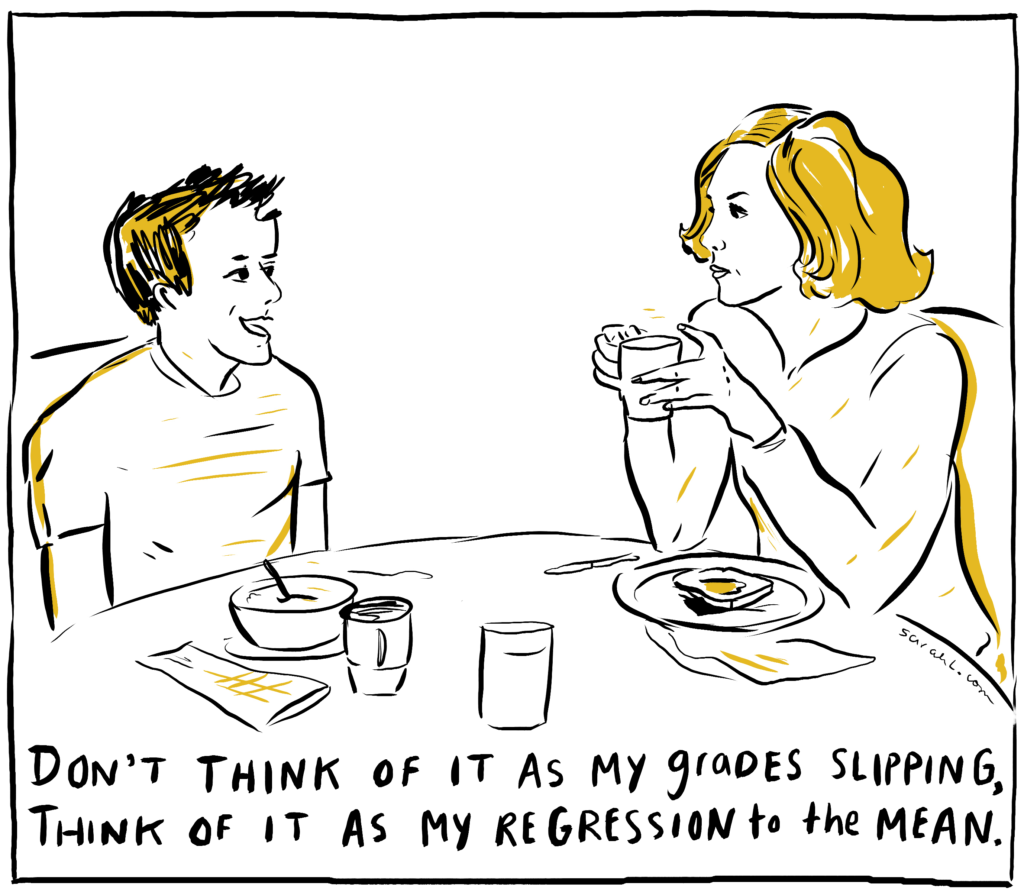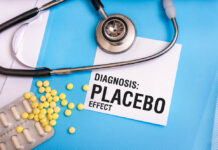A new article by Michael P. Hengartner explores the possibility that the statistical phenomenon of regression to the mean may be responsible for the dramatic effects of placebo in psychiatric drug studies. Hengartner is a clinical psychologist at the Zurich University of Applied Sciences, and the paper was published online ahead of print in BMJ Evidence-Based Medicine.

Regression to the mean is a statistical term. Under this theory, scores that are outliers (at the extremes) are likely to move toward a more average value spontaneously. An example illustrates this phenomenon.
People with moderate depression, experiencing a variety of environmental stressors, are likely to improve slightly when a stressor is removed, or when their life gets better. This slight improvement may even be enough to move them toward not meeting criteria for depression. People with severe depression, though, are likely experiencing intense environmental stressors. If one of these problems changes for the better, it can make for a dramatic shift in someone’s life.
Thus, the people on the extremes of these experiences are statistically more likely to undergo a more significant shift toward the average experience. These changes happen spontaneously, through the shifting of all of the complexities of a person’s life.
The usual metaphor for regression to the mean is that of a baseball player. After a great season (let’s say they hit a lot of home runs), fans expect that player to do just as well in the next season. But, often, that doesn’t happen. In sports, this is called the sophomore slump. This occurs because the player was not that much better than the other professional players—they just got lucky that season. Chances are, across a whole team, one player would get a bit more fortunate than the rest. But luck doesn’t hold forever. The next season, that player is back to average, and a different player gets the lucky hits.
Most psychiatric drug effectiveness studies enroll people with pretty severe symptoms—meaning that their entire participant pool may consist of these outliers.
Hengartner provides the real example of a clinical trial of repetitive transcranial magnetic stimulation (rTMS) for veterans with depression. The participants selected for this trial had undergone several trials of medication and did not improve, so they were considered “treatment resistant.” Many of the veterans also had diagnoses of PTSD, substance abuse, and were deemed to be suicidal.
Since these veterans had already experienced several trials of medication without improvement, they had already experienced the potential for the placebo effect (receiving treatment intended to remedy their symptoms)—and it had not worked for any of them. Thus, it could be expected that the placebo response rate in this study would be very low, close to zero.
Instead, after less than two weeks, an astonishing 37% remitted after fake rTMS treatment. A slightly higher 41% remitted after the real treatment (note that this difference was not statistically significant, meaning that the actual treatment was no better than placebo). That is, 37% had remission of symptoms, not just improvement, meaning they improved so much they no longer had the diagnosed disorder.
Now, this is an incredibly high number. According to this study, 37% of people could be cured of depression, PTSD, suicidality, and substance abuse, after having tried drugs with no improvement, all by using a fake treatment, in less than two weeks. The researchers of that study, according to Hengartner, pin that improvement on the placebo effect—attention from medical staff and the belief that this treatment would work.
But they’d already tried two treatments that were supposed to work, without experiencing that improvement. Why would they believe this experimental, controversial procedure would work better than the established treatments?
Hengartner provides an alternative possibility. Both the placebo effect and the actual rTMS effect were actually due to regression to the mean. The participants selected for this study were undoubtedly scoring at the extreme ends of the measures used to test them, with severe, suicidal depression and PTSD symptoms, as well as substance abuse. So the statistical trend that researchers should have expected, based on years of research into regression to the mean, is that many of these participants could have gotten better spontaneously, without any treatment at all.
Hengartner provides evidence from other research to back up this claim. A study from 2013 found that, without treatment, 53% of people could expect to experience full remission from depression within a year. Even in the short-term (3 months or less), 23% of people had remission from depression without treatment.
Another analysis cited by Hengartner found that the number of people who experienced full remission from depression was the same whether they received placebo treatment or no treatment at all—a clear indicator of regression to the mean.
Finally, he compares these numbers to the STAR*D trial—the largest and most comprehensive real-world trial of antidepressant medications. In the short-term results from STAR*D, 28% of the participants experienced remission while taking an antidepressant drug.
This number—28% after taking a drug—may be statistically different from the 23% who experienced remission after no treatment, but it is unlikely to be clinically significant. And it should be noted that in the long-term, the STAR*D trial demonstrated the failure of the drugs—only about 3% of the participants that were still enrolled in the experiment had remission of depression at the one-year follow-up. Meanwhile, no treatment at all results in more and more people improving over time, up to 53% by one year.
Hengartner’s analysis suggests that regression to the mean is responsible for a large part of psychiatric drug effectiveness and that long-term data demonstrate better results from no treatment at all, throwing into question much of the research base of psychiatric interventions.
****
Hengartner, Michael P. (2019). Is there a genuine placebo effect in acute depression treatments? A reassessment of regression to the mean and spontaneous remission. BMJ Evidence-Based Medicine. Published Online First: 11 April 2019. doi: 10.1136/bmjebm-2019-111161 (Link)















The arguments you always here from clinicians is that it’s not the experience they have when dealing with patients in their practice. I wonder why this descrepency is so common. Are the trials somehow severely flawed or are the clinicians not being entirely honest?
Report comment
The clinicians believe their own “antidotal reports” are valid, because they’re “professionals.” But they believe all client descriptions of the psych drugs are invalid “antidotal reports,” since they come from mere clients. An example of this is the systemic psychiatric denial of the fact that antidepressant withdrawal causes “brain zaps.” Read all the way to the “Conclusion” of this piece, the lack of respect for the clients is blatant.
https://www.researchgate.net/publication/247806326_'Brain_shivers'_From_chat_room_to_clinic
The reality is “the clinicians [are] not being entirely honest,” and sometimes they’re outright pathological liars.
Which may be the case for the majority of clinicians given that the “long-term data demonstrate better results from no treatment at all, throwing into question much of the research base of psychiatric interventions.”
Report comment
Confirmation bias is very strong. Few people believe that they could be doing damage by their own usual practices.
Report comment
What we seem to be calling “effectiveness” referring to the psychiatric drugs is really merely a more rapid change of state. But we know also that the brain adjusts to the drugs so that the next depressive episode will need more of the drug or an additional drug or the “patient” may become “treatment resistant”. So our rush for a rapid improvement sets the “patient” up for a more difficult “recovery” in the next episode, and so on. (And it’s assumed the source of distress is within the individual, of course.)
Of course, people in distress are no different from each other whether it’s the new mother we sympathize with or the homeless guy who remains invisible to most until we are inconvenienced by having to step over him on the sidewalk.
Human is human. Distress is distress. Our culture is broken. Humans are not disposable. Drugs don’t make up for lack of community and lack of socializing. They don’t heal the nervous system damage that results from lack of touch and lack of human contact. Drugs don’t make us more sensitive to our own and others emotional existences. They cut us off and emotionally embalm us into our own individual ecosystems so that we not bother anyone else with our troubles.
We don’t need more drug studies, we need more humanity. We need less competition for resources and a guidebook on how to cooperate again. We need to rid ourselves of culturally imposed notions of success that involve accomplishments and material wealth and start judging ourselves and others on our measure of kindness and cooperation and love…
We must learn to be human again or we will not recover. We are not the Borg. We must not assimilate any further. Wake up, people!!!
Report comment
Well said.
Report comment
The deceptions here are amusing, as well as the results. People are living up or down to expectations. Mostly down. You give people fake MRI scans, those people that receive fake MRI scans that say they are improving, think they are improving, and their dispositions change. Apparently, placebos work better for people suffering from severe depression than previously thought, provided you can deceive them into thinking so.
Report comment
“People are living up or down to expectations.” The power of placebos and nocebos is vastly underrated.
Report comment
The magic of rTMS is explained (from a website that commercializes the treatment) by the fact they can cause your thumb to twitch if they direct pulses at a certain part of the brain. I’m sure it’s a trivial step from there to curing treatment resistant depression.
Report comment
The obvious point that is overlooked here is that the psychiatric profession “diagnosed” these people “treatment resistant depression,” when in fact there was nothing wrong with them that some artificial hope and time passing could not change. How is it possible that these people were deemed “treatment resistant” when they were completely capable of “self-healing,” if there was even anything to heal in the first place? Rather than “regression to the mean,” is it not in fact likely that the withdrawal of psychiatric diagnosis and “treatment” and the hopelessness that it conveys was the biggest variable in these miraculous recoveries from a supposedly hopeless condition?
Report comment
Good point; psychiatry is a powerful nocebo!
Report comment
How is regression to the mean any different from peer pressure? I was in a day treatment program where all the other patients were much worse off than I was. They were suffering from TD, multiple incarcerations, and were overall very depressed. I didn’t even know what I was getting myself into, thinking it was going to be like college. I was definitely peer-pressured to become more disabled, more depressed, more incapable. Why? Because the rest of them were. I started smoking, too.
In eating disorders prisons, kids are under immense peer pressure. “Almost dying” becomes the new “in” thing. If two are tubed, they all stop eating so they, too, can have the tube status symbol. When passing out becomes popular, well, you can guess.
Report comment
Treatment-resistant, in my case, meant they missed the boat entirely for 30 years. I would walk into their offices and say, “I am very depressed because I binged again.” They would say, “Never mind that. How is your bipolar?” Their bipolar-type treatments sure did not help my eating disorder. When they increased the meds, it didn’t help my ED any, so they called me “treatment-resistant” because I continued to complain.
Report comment